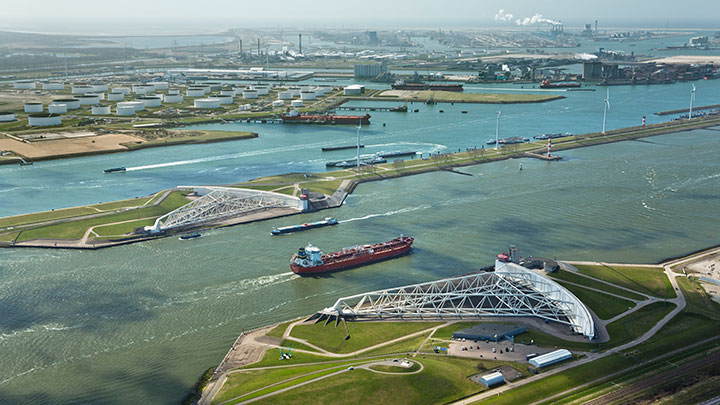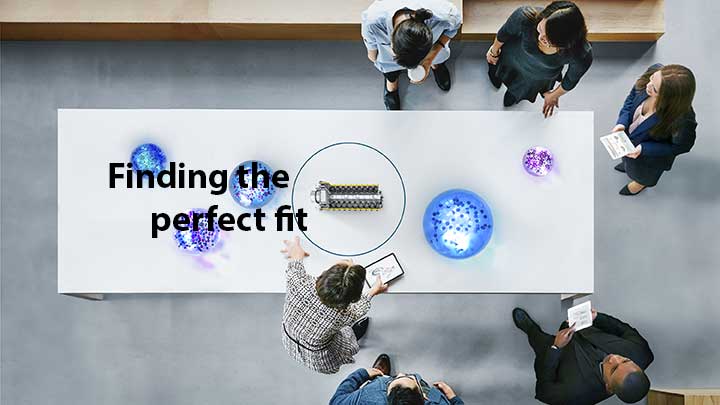Powering sustainable shipping
The global shipping industry is working towards a sustainable future. This means that you will face important choices about the technologies and investments you need in order to stay competitive and at the forefront of compliance for decades to come.
At MAN Energy Solutions, we are helping to shape the sustainability agenda and provide a clear path for you to achieve your goals. As the industry’s trusted partner for class-leading marine systems, we have the expertise and solutions ready
now to support whatever decisions you make.
Introduction to future fuels
Reduction of greenhouse gas emissions in maritime shipping to meet the 2050 targets requires all parties involved and stakeholders to take action.
No matter what vessel you operate, our proven, fuel-flexible engines and propulsion systems enable you to safeguard your future fuel strategy and allow you to take advantage of favorable market conditions. We can also support you with a complete portfolio of retrofit solutions, upgrades, and services, designed to optimize returns from your existing investments.

Future fuels survey 2022 - results
At the end of 2022 we asked our four-stroke customers to participate in our short survey about Future fuels in the maritime shipping industry. Out of all replies, we have extracted and summarized the most relevant results and are happy to share them now with you.
When do you expect the following fuels and engine attributes to be relevant in your application?
In the short and mid term, biofuels and methanol are expected to take the lead and be most relevant for four-stroke applications in the upcoming years, in parallel to a continuously relevant share of LNG driven vessels.
Mid to long term, additional fuels, such as NH3 ready or even H2 may gain relevance.
Future fuels for the maritime industry – Download our new white papers
The shipping industry must halve its GHG emissions by 2050. There are many future fuels to choose from. But which one is right for you?
Learn more about future fuels for the marine industry in our white papers.
Read more about the different future fuel types and discover our extensive portfolio of products, solutions, and services.
Get in touch with our experts
Would you like to learn more about future fuels and which technologies, solutions, and products best meet your needs?
Our global network of dedicated engineers is happy to point out the perfect-fit solution for you and your business. Start your engines now and reach out to us today.

Explore your fuel options
We can now offer multiple options for full fuel flexibility, engine-integrated emission reduction technologies and digital & data-supported operation.
Check out our configurator for two- and four-stroke engines, and find out more.
Related news
Industry Consortium to Develop Medium-Speed, Ammonia-Fuelled Engine
MAN Energy Solutions has begun the ‘AmmoniaMot’ (Ammonia Engine in German) project. Initiated by MAN with partners from industry and research institutes, it aims to define the steps necessary to produce a dual-fuel, medium-speed engine capable of running on diesel-fuel and ammonia.
Supported by the German Federal Ministry of Economics and Technology (BMWi), and due to run for three years from December 2020, project partners include the University of Munich, Neptun Ship Design, WTZ and Woodward L’Orange.
MAN Energy Solutions Dr. Alexander Knafl, Head of R&D, Four-Stroke Engineering, Augsburg, said: “MAN Energy Solutions views this project as closely aligned with its own strategy for developing sustainable technologies and welcomes the opportunity to work with external partners. For us, the path to decarbonising the maritime economy starts with fuel-decarbonisation and, in this context, ammonia is an excellent candidate in that it is carbon-free and eminently green when produced from renewable electricity sources.”
Christian Kunkel, Head of Combustion Development, Four-Stroke R&D, MAN Energy Solutions, said: “With the DNV classification society forecasting approximately a 30% share of the maritime fuel market for ammonia by 2050, there is a general need for successful engine projects to display ammonia’s viability. There is little doubt but that ammonia will become an important carbon-free energy carrier and thus will contribute to decarbonising the maritime sector. The AmmoniaMot project will deliver the base for future, commercial, four-stroke engines, which will be key in legitimising ammonia as a fuel and furthering the maritime energy transition.”
MAN Energy Solutions Two-Stroke Business has already announced that it will deliver ammonia-fuelled engines by 2024.
Partner roles
The University of Munich (TUM) will employ a rapid-compression expansion machine to establish the fundamentals concerning the combustion of ammonia and will develop, together with MAN, the combustion models necesary for fast adaption of the technology to different engine sizes.
Neptun Ship Design (NSD) will analyse international regulations to ensure technical and safety requirements in a encapsulated, modularised fuel system. Such scalable components are a prerequisite for the introduction of ammonia engines in shipping. A prototype of the fuel system itself will be used on the test engine at WTZ. NSD will work in close cooperation with MAN on a roadmap regarding which steps are necessary to use ammonia engines with all necessary ancillary systems in new ships and conversions.
WTZ is a specialist within the field of energy conversion and will utilise a high-speed test engine to develop a combustion concept for the new engine. This will be done in close collaboration with MAN and will also form the basis for defining any requirements for exhaust-gas aftertreatment.
Woodward L’Orange is a leading manufacturer of injection systems and will produce the injection system for the ammonia tests at TUM and WTZ. Together with MAN, the technology will be scaled up to large, four-stroke engines in the project.
MAN Energy Solutions will transfer the technology to large-bore, four-stroke engines and and prepare for commercial development and production.
Documents
-
20210407_MAN_ES_PR Four-Stroke Ammonia Engine_EN
-
20210407_MAN_ES_PR Four-Stroke Ammonia Engine_DE
Contact
Nils Søholt
Trade Press Marine
Group Communications & MarktingMAN Energy SolutionsTeglholmsgade 412450 Copenhagen SVDenmark
nils.soeholt@man-es.com t +45 33 85 26 69Available languages
- DE ·
- EN
Get notified about press releases
Explore more topics
Alternative fuels for your two-stroke powered vessel: Ammonia, methanol and methane in focus
Watch the recording of our latest MAN ExpertTalk on alternative fuels for large merchant marine vessels. Get insights into the most promising marine fuels of the expected future fuel mix for two-stroke vessels, namely ammonia, methanol and methane.
You can also look forward to hearing about the latest product developments and applications as well as reasons why these fuels have the potential to offer a straightforward path for the future maritime energy transition.
